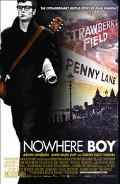
Directed by
Sam Taylor-Wood
Rated M
Reviewed by
Bernard Hemingway

Nowhere Boy
Synopsis: An account of the early years of John Lennon.
As a generic Rebel Without A Cause-type troubled teen movie Nowhere Boy works well enough. In fact, bar the modern sensibility, stylistically the film might have come straight from the 1950s. Given that this is the historical period in which it is set you might think that this would work in its favour but it does not. The trouble with Sam Taylor-Wood’s debut feature is that for a biopic, its carefully burnished surface does not allow for any sense of real substance to break through. In the starry-eyed 1950s this was an acceptable approach to the lives of the famous. Today it is not. In the lead Aaron Johnson does quite an adequate job (although his Lancastrian accent comes and goes) but doesn’t really bring much more than his good looks to this portrayal of the beginnings of one of the legends of 20th century pop music.
I don’t know much about John Lennon’s origins but i suspect that makers have take some liberties with the historical facts as they are known (somewhat disconcertingly, the film is based on the memoir, 'Imagine This: Growing Up With My Brother John Lennon', written by Lennon's half-sister, Julia Baird). But as much as the film is stuffed with the paraphernalia of everyday life in the 1950s it never feels convincing. In part, this is due to the abundant sunshine and the colourfully neat bungalow-lined middle-class streets which hardly gel with the entrenched image of damp and grey post-war Northern England as the breeding ground for the most significant shift in popular music yet seen.
The most insistent instance of this incongruity comes with the casting of Kristin Scott Thomas as Lennon’s Aunt Mimi. Scott Thomas is regularly seen in upstairs-downstairs period dramas, her elegantly chiselled features and aloof air perfectly suiting demands for upper-class types. Not the look you’d expect to find in mid-'50s lower middle class Liverpool. As a funny moment involving Earl Grey tea late in the film makes clear, Mimi had pretensions to the better things of life but Thomas plays her as already arrived – a kind of Liverpudlian Katharine Hepburn, mysteriously possessed of to-the-manor-born hauteur. There is no explanation of how Mimi managed financially after the death of her husband and I must admit, so alien did she seem to her environment, that I was was surprised to find out that she really was John’s aunt. Of family resemblance there is none, indeed, other than in production design, resemblance is a low priority in this film.
Taylor-Wood, who apparently was also an abandoned child (and is an established visual artist), is more concerned with the painful relationship between John and his mother, Julia (Anne-Marie Duff) as the well-spring of Lennon’s creativity. A woman with a chronic need for “company”, as Aunt Mimi euphemistically puts it, and a love of 'rock 'n’roll, she is portrayed as a kind of Magdalene to John’s rebel Messiah. Like her sister, but in a very different way, she also, one imagines, was an unusual character in Liverpool of the time. Yearning and anxious, Duff is very effective as a polar opposite to Scott Thomas’s quintessential English disciplinarian although the portrayal of her relationship with John as near-sexual seems quite a stretch. The screenplay by Matt Greenhalgh (who also penned the 2007 Joy Division film, Control) treats this aspect suggestively, allowing Lennon’s late song, the cathartic “"Mother", to carry the burden of implication.
As a fictionalized history of Lennon's metamorphosis from snotty-nosed teenager to brilliantine’d rocker the film is reasonably entertaining, once again in a generically biopic way. It is however hardly likely to satisfy Beatles fans or even just fans of pop music and there is not enough of interest here for the overall slow pacing. The music numbers skew the film well out of the realm of actuality and into Fantasy Land. The first gig of The Quarrymen at a local fair shows John and his mates, apparently without any musicianship whatsoever, making a sound that veterans would die for and then later at a local dance playing scorching rock n’ roll with no visible means of amplification. And future Beatles, Paul McCartney (Thomas Brodie Sangster) and George Harrison (Sam Bell), are both depicted as being adepts with Delta blues guitar licks (but, rather oddly, having no physical resemblance to their real life equivalents). How the lads got from these down-home roots to “Love Me Do” is anyone’s guess.
With only a tangential interest in Lennon’s or the Beatles’ music and a relatively soft and conventional approach to John as a mixed up youth destined for greatness it’s hard to see this film as having more than passing appeal for all but the most nostalgic of baby-boomers. Nowhere Boy works best as a teen psycho-drama but then I’d be surprised if many teens will be willing to extract the Oedipal issues from amongst the club sofas, mantel radios, Ford Prefects and smirking Teddy boys.
FYI: If you'd like to follow the lads to Hamburg see Backbeat (1994)
Want something different?





